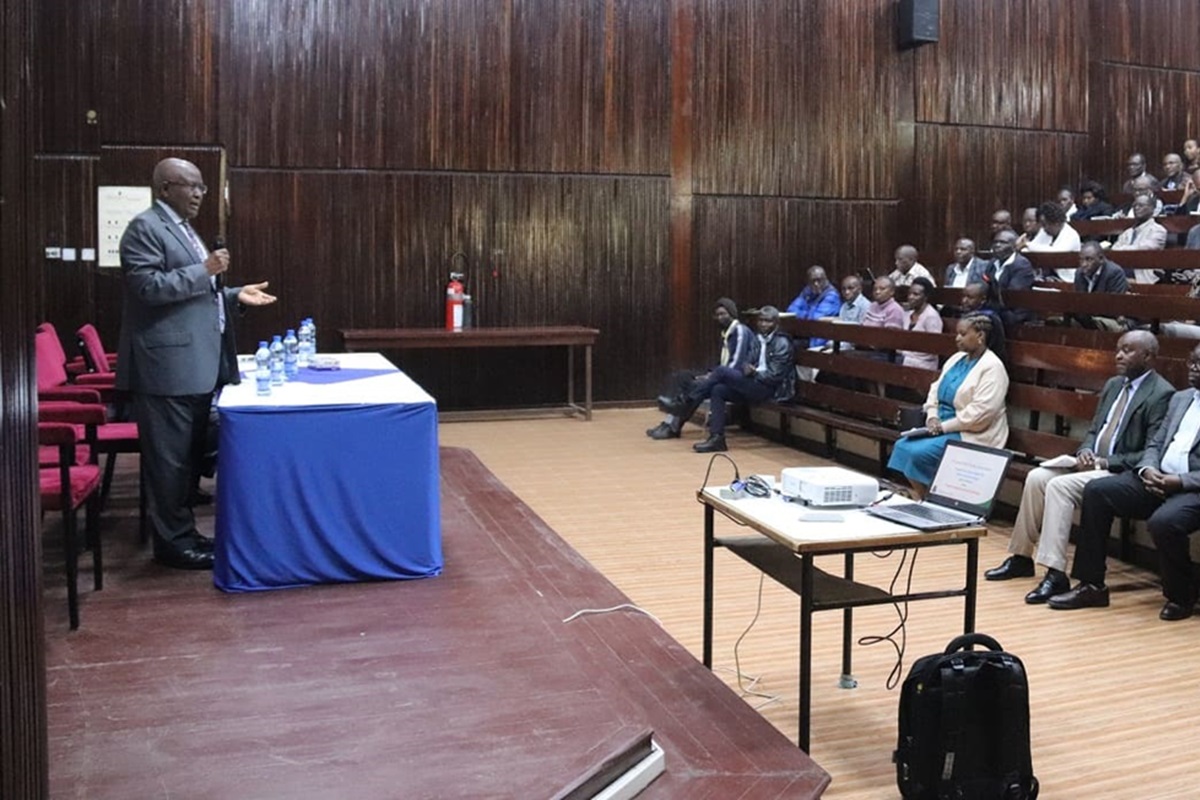According to a September 2020 update report by Food Security Information Network (FSIN) and Global Network Against Food Crises, about 6.22 million people in Kenya are currently either in a stressed, crisis or emergency food-insecure situation while the number of people who cannot access or afford safe, nutritious foods is even higher
Prof. N. Mungai, TAGDev Program Coordinator
4th National Forum for Universities, TVETs and Industry Players in the Agricultural Sector
Through the “Transforming African Agricultural Universities to meaningfully contribute to Africa’s Growth and Development (TAGDev) Program, Egerton University held the 4th National Forum for Universities, TVETs and Industry Players in the Agricultural Sector on 21 and 22 July 2021 virtually from the Main Campus in Njoro.
The forum’s theme was “Food Systems and Entrepreneurship for Sustainable Development” and focused on food systems, entrepreneurial growth and development in the agriculture industry.
Speaking at the forum on behalf of the Cabinet Secretary, Ministry of Trade Industrialization and Enterprise Development Hon. Betty C. Maina, Mr Lawrence Karanja said that the Ministry is at the forefront of championing locally manufactured goods.
“At least 40% of the government’s budget is to be spent on local goods, which will encourage youth to engage in entrepreneurship. In addition, the Ministry is rolling out intellectual property awareness campaign which will enhance and protect intellectual property. To improve the efficiency and cost of rendering services, we have formed Kenya Intellectual Property Authority, and we will work with academia in enterprise development,” said Mr Karanja.
While giving his remarks, the acting Vice-Chancellor Professor Isaac Kibwage said that the University organized this year’s National Forum to contribute to the national dialogue as a pre-2021 UN Food systems summit and that Egerton is committed to offering high-quality tertiary education, research, innovation and outreach to promote the requisite transformation of Kenya’s food systems.
“The University offers research and policy support for increased agricultural productivity, value-addition to minimize food losses, diversification of food and feed sources, commercialization of innovations, youth engagement in agricultural value chains and tackling agricultural-related challenges”, said the acting Vice-Chancellor.
TAGDev Program Coordinator & Acting Director Research & Extension Professor Nancy Mungai said that the objectives of the national forum are to take stock of the current situation in the agricultural sector in terms of agri-food systems capacities, actors and policy framework. She further stated that this year’s forum included conversations on private sector involvement in agri-food systems, emerging food systems, and critical political issues influencing agri-food systems.
“According to a September 2020 update report by Food Security Information Network (FSIN) and Global Network Against Food Crises, about 6.22 million people in Kenya are currently either in a stressed, crisis or emergency food-insecure situation while the number of people who cannot access or afford safe, nutritious foods is even higher,” said Prof. Mungai.
“This creates the need to engage agricultural stakeholders to discuss key threats and challenges to food systems and the interventions needed to achieve sustainable development”, added the TAGDev Program Coordinator.
Prof. Mungai noted the importance of entrepreneurship as a critical driver to sustainable economic growth and job creation in developed and developing nations. However, entrepreneurs encounter several challenges that hamper their success. These challenges include inadequate entrepreneurial training, small market size, poor financial services, and tight laws and regulations.
“Collaborative approaches are crucial in addressing these challenges, including collaborations between academia, public and private sector through trade exhibition which will play a critical role in promoting individual business,” she added.
Ms Lucy Njenga representing the Chief Administrative Secretary in charge of Crop Development and Agricultural Research at the Ministry of Agriculture, Livestock and Fisheries, reported that the Ministry has come up with ‘Youth in agribusiness strategy’ to streamline challenges experienced by youth.
The Kenya Private Sector Alliance (KEPSA) Chief Executive Officer Ms Carol Karuga reiterated that collaborative approaches are crucial in addressing these challenges, including collaborations between academia and the private sector through support for research and development and commercialization of research innovations.
The main objective of the 4th National Forum was to enhance collaboration between Egerton University, policymakers and key industry players for sustainable food systems and entrepreneurial growth and development.
There was also a panel on ‘Youth Devolution and Agrifood Systems’ and some of the key messages emanating from it were the need to provoke the industry to encourage youth involvement in agriculture and food systems and the need for capacity building for farmers and youths specifically because they are receptive of new technologies for improving agri-food systems.
The two-day forum provided a platform for various stakeholders to showcase their innovations through short video clips.
On behalf of the University, the VC Prof Kibwage and UMB wishes to take this opportunity to thank the organizers of the 4th Ruforum National Forum led by Prof Nancy Mungai, Ag Director of Research for bringing together global scientists, Cabinet Secretary in Ministry of Agriculture, Livestock and Fisheries, Kenya Private Sector Alliance (KEPSA), policymakers and key industry players and farmers on this very important discussion on how we can develop Sustainable food systems and entrepreneurial growth and development, targeting the youth to be attracted to Agriculture.







